This is the weekend edition of TheMarioBlog and will be updated as needed. The next blog post is Monday, January 14
Update 1: Friday, Jan. 11, San Jose, California, 04:31
TAKEAWAY: The launch this week of the Silicon Valley Business Journal in San Jose has created quite a buzz: many see it as a groundbreaking project that can serve as a model for creating the effective harmony across platforms.
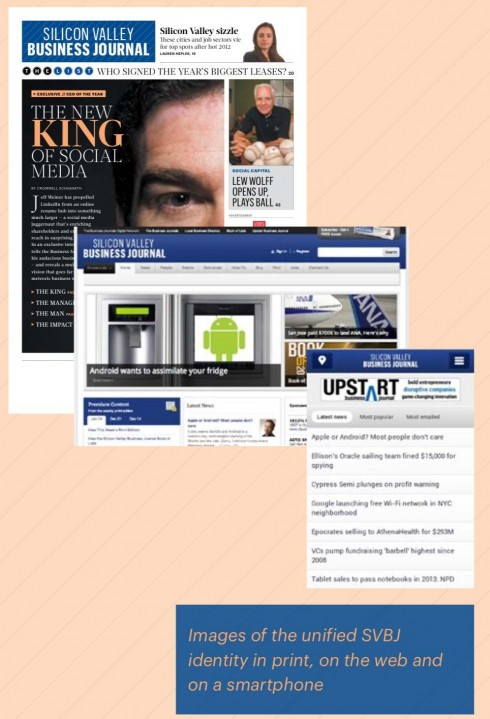
The new Silicon Valley Business Journal across platforms
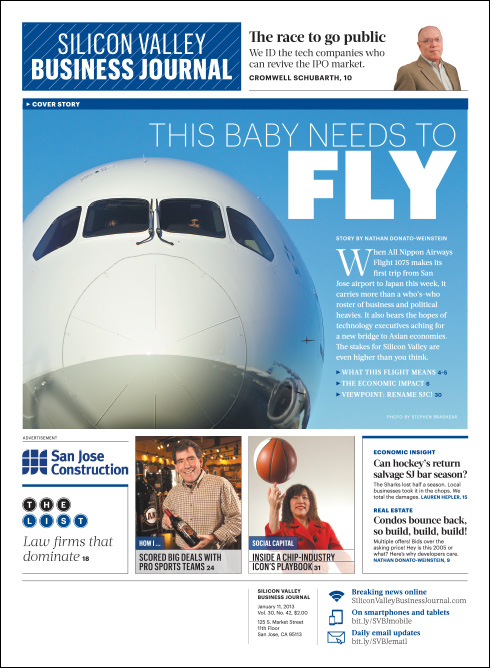
The front page from week two of the new Silicon Valley Business Journal
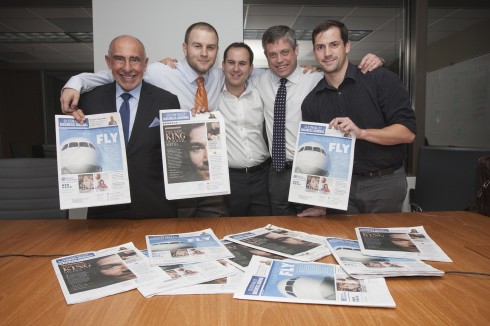
Celebrating launch of the second edition of the newly rethought Silicon Valley Business Journal, from left, Mario Garcia, Jon Wile (creative director, ACBJ), Reed Reibstein (Garcia Media), Emory Thomas (chief content officer), and Ryan Lambert (art director, SVBJ)
Doing print happily is probably the best way to describe what has taken place in San Jose, California, this week as the newly rethought and redesigned Silicon Valley Business Journal has finally made its grand entrance.
Here is a printed newspaper that seduces visually and journalistically.
If a copy of this business weekly is on your desk, you simply must turn to it and check it out. The excitement starts on Page One, with what we call internally the “centerpiece” story—which falls into the category of “invisible” news. In a world saturated with constant information, and news that breaks on Twitter and Facebook, the role of the printed newspaper is to amplify, to analyze, but, better yet, to get to those invisible stories that those in a hurry to report via 140 characters may not have the time for.
The front page of the SVBJ will showcase those type of invisible stories, making them very visible, appealing and part of a lean-back experience.
At the new Silicon Valley Business Journal, part of the rethinking is how to handle breaking news. How do we define the Digital First phrase (which, I must admit, is becoming quite clichéish and tired these days) for its genuine spirit: Reporting the news when it happens via digital platforms, but finding avenues to expand into its more invisible aspects for the print edition and tablet.
For seven months during this so-called Project Pinstripe (because of the pinstripes that are part of the new branding), we have conducted workshops and sessions with editors to arrive at our new definition of news, and to make sense out of the Digital First mandate—something I know from experience many newsrooms globally are doing.
In this project, a key person charged with guiding that discussion is Emory Thomas, chief content officer for American City Business Journal.
I thought it would be useful to many of you if I asked him about the challenges he and his team have faced in implementing this new philosophy and the lessons he has learned in the process:
Three questions for Emory Thomas, ACBJ chief content officer
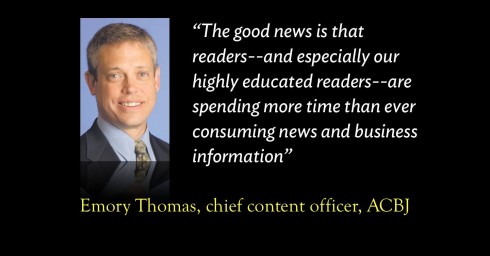
Mario: We talk much about the media quartet and the importance that each platform has; storytelling first, but each platform doing what it can do best. How has Project Pinstripe advanced this idea for SVBJ? And how do you see it advancing as the project progresses?
Emory:
Project Pinstripe as we’re now calling it, really does rationalize the news flow for ACBJ. Transactional breaking news really “wants” to live online
immediately. It “wants” to be released as soon as it is known. Enterprise reports that lay out the story behind the story, with narrative and charts and graphics and photos, “want” to live in print. They have their fullest life there. Many stories can and should live in both print and digital, just in different formats. By paying attention to where each piece of content most naturally lives, we not only serve our audience better, we make our jobs more manageable. Not that this is a simple transition. It’s not easy to change work patterns. It’s not simple, for instance, to expand one’s long-developed print writing style to include an appropriate conversational tone that fits the digital medium better. It’s also not easy, after years or decades of catering to a single platform (print), to serve several at once. But it is doable; we have examples inside our company where it’s working very well. We now need to share and spread those examples to all of our newsrooms.
Mario:Would you say that Project Pinstripe moves ACBJ towards a Digital First philosophy?
Emory:
Yes, Pinstripe is taking us to a digital-forward posture. It has to. The good news is that readers — and especially our highly educated readers — are spending more time than ever consuming news and business information. And the fact is, the vast majority of this consumption happens in the digital realm. We know this from the data. We know this from extensive focus groups with our audience. We know this from our own personal experiences. We must now alter our publishing operations and philosophies to match them with the real world, and the desires of our loyal audience. This means prioritizing digital publishing, and digital excellence.
Mario: How do you see the role of the print edition as these dramatic changes are made?
Print has a rich, vital, highly complementary role in the Pinstripe model. We have heard over and over from readers A) That they value print as a special experience, and B) That they look to print to help them interpret the news that bombards them day in and day out. That’s exactly what we’re going to do, spinning forward the news we report digitally throughout the week.
Print is actually a wonderful technology in its own right, offering readers who move from page to page a serendipitous discovery that digital can’t match. For the business journals, print readers can expect fabulous enterprise reporting that goes deeper, and tells stories in a more sophisticated and multidimensional way, than they’ve ever seen before from our products. They can also expect print to give them a special means for getting to know the community’s top leaders; print is particularly good at bringing important people and personalities to the surface in profiles and Q&As. The prioritized, smartly packaged, weekly print experience is a perfect complement to the rat-a-tat-tat news consumption business leaders engage in throughout the week
Previous posts on the Silicon Valley Business Journal
The new Silicon Valley Business Journal is here!
A new start for the Silicon Valley Business Journal in 2013
The design of the Silicon Valley Business Journal, from prototype to reality
Lessons learned from Silicon Valley, and a look at some details of SVBJ
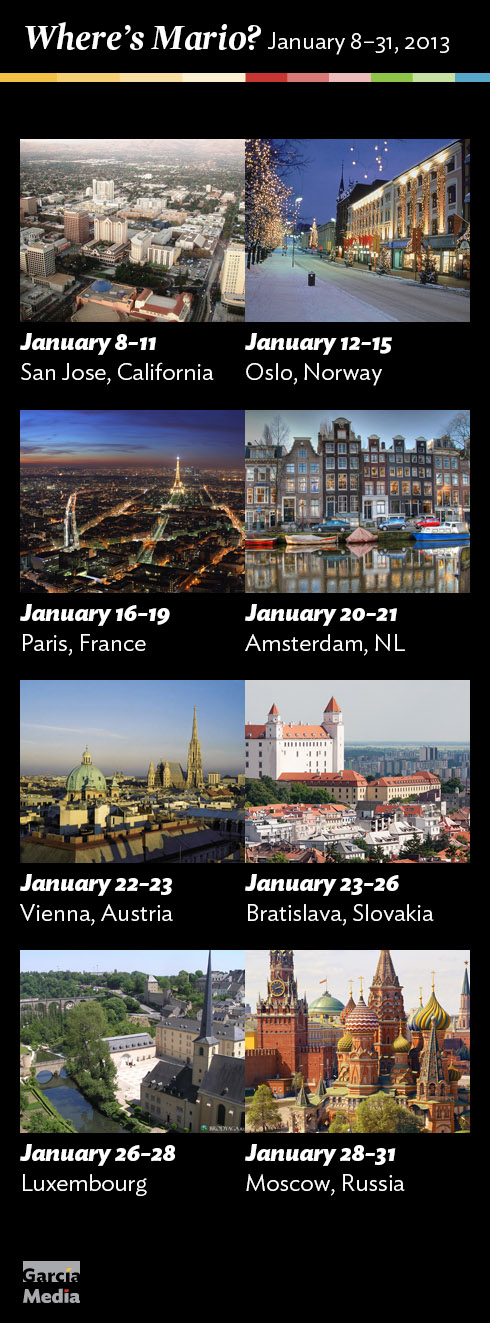
Take advantage of our iPad Design/Ad Lab workshops
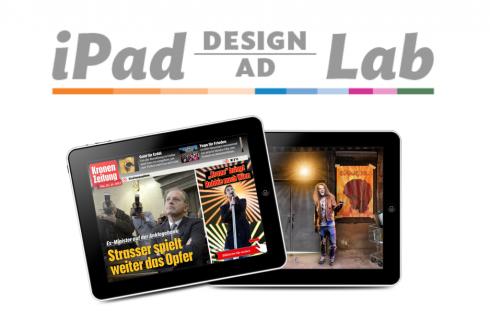
Do you want to take your brand to the next level by creating a tablet edition? Garcia Media can help. We now offer one- to two-day iPad Design Lab workshops on demand to jumpstart your presence on this exciting new platform. We also offer iPad Ad Lab workshops to develop engaging advertising models for your app. Contact us for more information.

Purchase the book on the iBookstore
The EPUB version of book is HERE:
Now available: The EPUB version of iPad Design Lab: Storytelling in the Age of the Tablet, ready for download via Amazon.com for Kindle:
http://tinyurl.com/8u99txw.
Here is how you can get the book:
The original version of the book is the multitouch textbook version available on the iBookstore for iPad (iOS 5.0 and up): https://itunes.apple.com/book/ipad-design-lab/id565672822. This version includes video walkthroughs, audio introductions to each chapter, swipeable slideshows, a glossary and a sophisticated look and feel.
Apple only sells multitouch textbooks in certain countries at this time, unfortunately. Copies are available in at least the following countries: Australia, Austria, Belgium, Canada, Finland, France, Germany, Great Britain, Greece, Italy, Latvia, Luxembourg, The Netherlands, Poland, Portugal, Romania, Slovakia, Spain, and the United States.
For those in other countries and without an iPad, we have made the book available in a basic edition for other platforms. This basic edition includes the full text of the original, along with the images and captions, but lacks the other features such as audio and video. It is available on the following platforms in many countries:
Amazon Kindle: http://amzn.to/SlPzjZ
Google Books: http://bit.ly/TYKcew
Take a video tour of iPad Design Lab
“iPad Design Lab” trailer on Vimeo.
Read the Society of Publication Designers’ review of The iPad Design Lab here:
http://www.spd.org/2012/10/must-read-ipad-design-lab.php
Garcia Interactive: a world of information

Keep up with Mario Garcia Jr.. via Garcia Interactive: helping transform online news since 1995.
www.garciainteractive.com